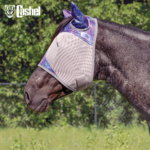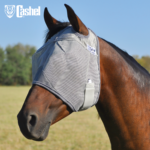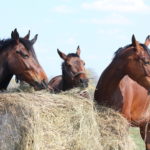Maintaining a healthy horse through rigorous show schedules and mosquito season can be difficult. However, adding in winter elements such as cooler temperatures, snow and ice can present a whole new set of challenges.

Whether your American Quarter Horse is at a breeding facility, a show barn or pastured, there are steps horse owners and managers can take to manage their horses for optimal health this winter.
Wind and cooler temperatures often mean closed-up facilities. Making sure horses have enough ventilation is important to helping prevent disease. Practicing good barn hygiene, both at home and on the road, can also help protect horses. Whenever possible, avoid sharing water buckets, lip chains, halters or other items that might touch the horse’s mouth, nose and ears. If items have to be shared, be sure to follow proper sanitation and disinfection techniques first. There are a number of commercially available disinfectants, such as ROCCAL? D PLUS and NOLVASAN? SOLUTION that are effective for killing bacteria. Veterinarians also recommend that every barn offer a shallow basin full of properly prepared disinfectant for people to wash their boots before entering or leaving a facility.
Ensuring that a horse has enough water is also important. Horses sometimes tend to drink less when the weather is colder. If a water bucket or trough is frozen, be sure to break and dump out the ice. Keeping the water temperature above 45 degrees F will encourage horses to drink during cold weather.
Horse owners and managers need to pay close attention to their horses? body condition all year, but particularly as temperatures drop. In the winter months, horses no longer have the nutrients in lush grass to supplement their diet. Therefore, making sure they have adequate, good-quality hay can help maintain an optimum body score. Depending on the horses? work schedule, their grain intake may need to be gradually increased or decreased. Any changes in diet should be done gradually and in consultation with a veterinarian first, as sudden changes in diet may increase the risk of colic.
Keeping horses comfortable and body temperature regulated is critical in winter health care management. If a horse gets cold and/or wet, he may have to exert excess digestive energy to keep warm. Blanketing may offer a solution but may not be necessary in some circumstances. If the horse has established a natural winter coat, it acts as its own insulation. However, if it is a show horse who has been clipped or the hair kept shorter to reduce sweating, then blanketing is probably necessary. If a horse is outside and gets wet from snow or rain, it is imperative to put on a dry blanket and to make sure his coat is dry before putting on the blanket. Also, be sure the horse has been properly cooled and his coat is dry after a rigorous workout.
Having every horse on a routine schedule makes it easier to maintain all year. Barn managers and owners should also work with their veterinarian to implement a strategic deworming program and make sure their horses are current on vaccinations.
Unfortunately, this can be the time of year when upper respiratory disease such as equine influenza virus can become a problem in facilities. The best method for helping protect horses against equine influenza is to have them vaccinated by a veterinarian.
Maintaining healthy horses in the winter months can present challenges for equine caregivers. As basic as most precautionary measures may seem, they are critical to protecting the overall wellness of each horse and the barn as a whole. Preventative care and basic hygiene also protect a horse’s health when traveling to winter venues where he is exposed to other horses and potential disease. By working with a veterinarian to create a wellness program that incorporates parasite control, vaccinations, routine veterinary care, dental exams, nutritional counseling and barn hygiene, equine caregivers can provide their horses with the best opportunity to achieve optimal health even in the coldest temperatures.





